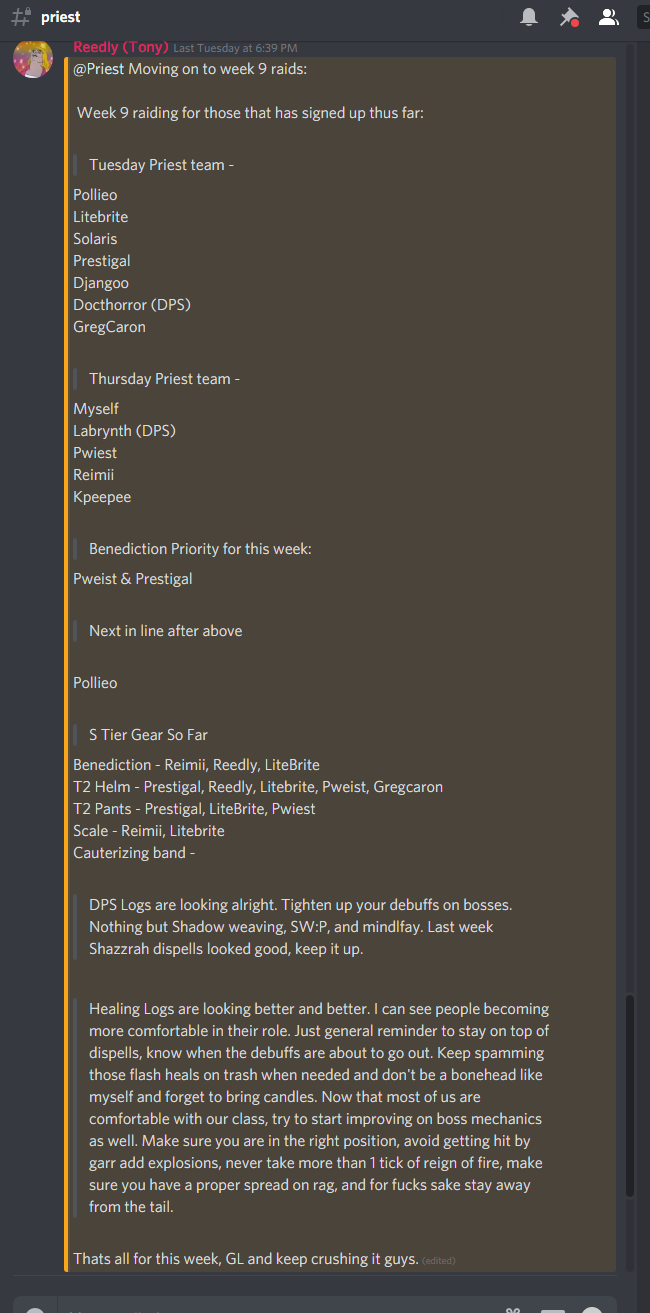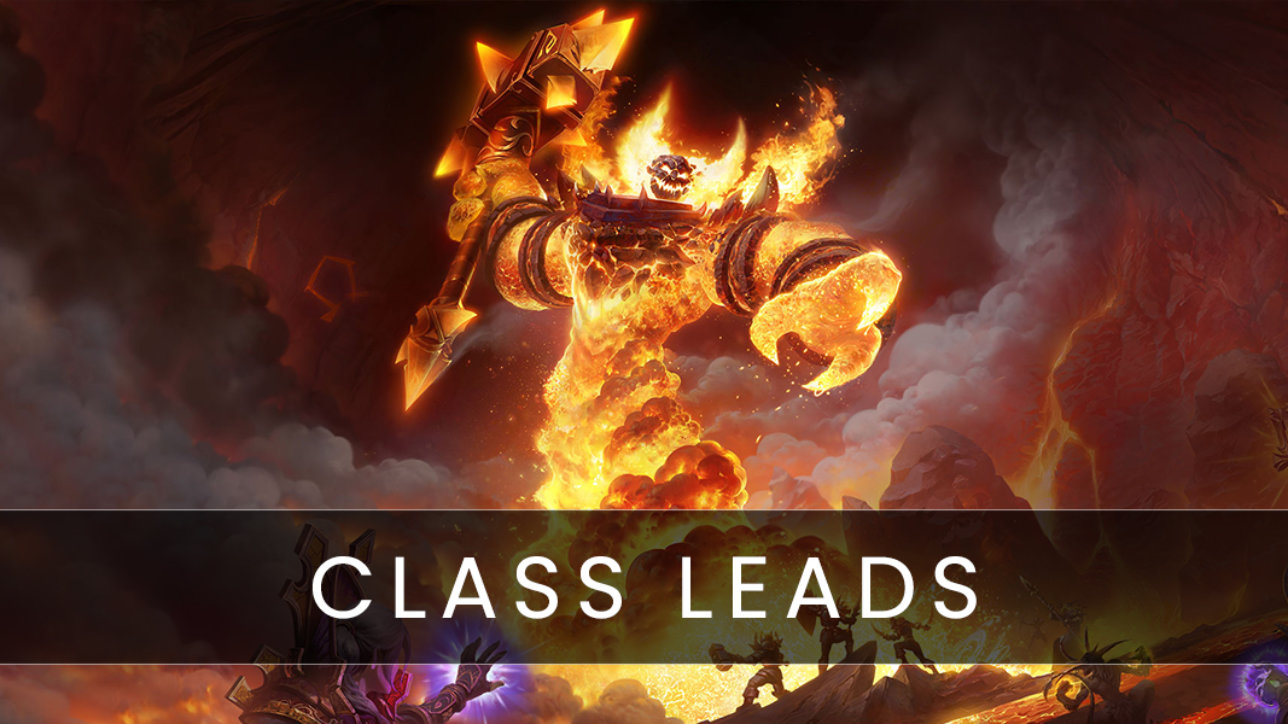A few have reached out regarding the few open class lead positions, asking for details and expectations of the role. I realized after the 2nd discussion in the past 48 hours this would be a repeated conversation over the coming months. So I figured it would be best to detail everything here. If after reading through this you still have questions definitely reach out. The purpose of this isn’t to replace future inquiry, just to reduce some of the more common questions. I can keep this as a working document and also dive into deeper detail where needed.
Time
Right off the bat, managing a class is an entire workload on top of a standard raid schedule. As a class lead, the requirements from the guild go up quite a bit. There’s a need to spend time diving into logs both internally and top parses. Researching potential new strategies and standards. Notes need to be kept on each player to identify problems areas or growth potential. Long form conversations are going to be expected as each player will need to touch on different subjects.
In terms of time, I would say anywhere from 2 – 6 hours a week should be spent managing class needs, guild expectations and council meetings. To contrast, Officers are putting in roughly 10+ hours/week, and I’m easily touching 40+. Piecing together this information page alone has been a full days undertaking. The workload needs to be broken down and spread effectively in order to increase information quality and reduce useless banter.
We all share the burden that lets this guild operate in the most seamless way possible, and the largest cost is time.
Purpose
The primary purpose of a class lead is to direct their selective class in 4 areas:
- Class and Guild Expectations
- Playstyle
- Itemization / Preparation
- Managing Drama
All of the Officers have been playing World of Warcraft since Vanilla, so we have a pretty good head for the general pathing in regards to how each class should function. However, given that we are running two full size raid teams there is a lot more going on. Cue the Credits historically is a guild that emphasizes growth. Our favorite players have always been those who ask the question “How can I improve?” The more mercenary types are reserved for the top world guilds, they don’t generally last long here. We’re happy to be server 1st and have been often, but we will not compromise our core values to achieve it. We are successful and continue to come together year after year due to relationships, not server status. Ask any Veteran why they came back, and the prospect of being server #1 will not be in that list, though it’s completely within reach. It’s important to keep that in mind for every lead because it should align how certain subjects are approached.
Player growth is important, and it’s expected that the class lead is there to assist everyone within their group where possible. There are varying personality types that handle critique better than others, and some are perfectly fine with being middle of the pack. Identifying those who are worth investing in and improving their play is crucial skill to possess. Ultimately the guild needs players who are actively considering their position within parses and guild systems. Complacency is a killer, and makes the game less enjoyable for both that player and the guild as a whole. Finding those gems and putting as much work into them as they are themselves is a huge step towards making a decade long relationship instead of one that lasts a single tier.
Items are a core element of every character, and it’s on the class leaders to ensure their players are doing their best work given their own unique situations. Understanding each player and all the variables that go into their character and guild position is important context to have.
Why is someone not full pre-bis?
Why have they not enchanted their gear?
Why are the only on for raids?
Why is their damage not meeting their current gearset?
Class leads need to be familiar with their core in order to speak confidently towards the weight of a given loot assignment. It very well could be that an item the council considers trash or exceptional, may have varying desires across that player group. Balancing the expectation there is important. A word of warning though, best-in-slot spreadsheets have made this considerably more difficult as each player across potentially many classes are all clamoring for the same set of items. Now that we have a high level view of all loot that has been distributed, the focus on transparency becomes more important. Letting each class know roughly what to expect for the high impact items (S-Tier) ahead of time is essential. Generally the council knows where the next key weapon or trinket is going. Having two raids does complicate this, but it also allows us to be substantially more flexible in regards to how items are handed out. The odds more than double that an item will potentially be received, simply because we can organize raids to make sure that a particular player is aligned properly to receive something should it drop. Knowing which players need to be split up and put together is pretty important.
A simple example would be Hunters. Due to Hunter gear being so plentiful and each player having different pieces, allocating who goes to what raid is essential in making sure loot is placed in the most effective way possible.
Managing personalities is a challenge, but as we grow and move more towards aggregated data and less towards ‘gut feeling’, it can become difficult to get a heartbeat on general sentiment of a given player group. I will say for me it’s been the most challenging it’s ever been. Simply due to time constraints real life puts on us as adults and the scale of what we are doing here. I take pride in knowing when players are happy and when there are concerns to be addressed. However I’m having to lean heavily on Officers and Class Leads to keep me educated on all relevant topics and potential concerns. Maintaining regular communication with each player within a leads pool is important. They need to respect the Class Lead but also feel like they are approachable. If that isn’t happening, that’s a topic that will need to be addressed.
Expectations
In terms of expectations, each class lead needs to be respected above all else. Respect is earned, not given. When we consider these promotions it’s a long conversation about current perspective of a particular player, and also future once they are given greater status. Execution is not the only requirement for a respectable class lead, but it is a nice foundation to build upon. We have historically had great players be placed into class lead positions that ended up having an entire core resent them because the title shift changed the conversational dynamic to something less desirable. It’s unavoidable, but trying to mitigate that with continuous discussion both public and private goes a long way. The expectation is that there would be constant communication of the council’s objectives in regards to systems and loot. It helps considerably to separate a class lead from “just a good player” to “someone who helps all of us be better”. An example of this type of directive can be seen by Reedly, the Priest lead who is currently kicking ass.

This is perfect direction in regards to key priest items and general improvements to be made across the board. Now, each class won’t be able to direct loot as clearly as Benediction order, but rough expectations can be set. It’s particularly helpful to publicly prop up those who are doing well, as when loot begins to cascade into that player a few things are noted by all:
- That player played or improved greatly
- That players effort was openly recognized
- That player was rewarded
Conversely, if someone is dramatically under performing, addressing that is equally important. Managing a group of players is largely about setting expectations and creating open standards. Reducing surprise and increasing transparency where possible is very important.
Cross-Class Knowledge
It’s expected to have at least a broad understanding of each class in regards to their core strengths. If a particular concern begins to stir, the class needs to be able to speak confidently as to why a decision was made, especially if it includes cross-class impact. It helps to know where a player stands in their own class, but also against other players in that archetype.
Player Rating System (PRS)
Class leads will be expected to sit down with the council on a scheduled basis to assign numbers to each player in their core, and give input on members of the guild as a collective. The PRS sheet as it moves forward will serve as our windstream when we are handing out ranks and gear. Identifying key areas for improvement is critical. It’s not fair to the player to assign a high or low figure without a reason. Eventually PRS will be public knowledge, so being able to speak with confidence towards decisions that are made is critical. With over 80 players to sort through, the list needs to make sense.
WarcraftLogs
Each class lead should be familiar with how to parse WarcraftLogs for key information pertaining to their class. Approaching a log for a few encounters with some key questions to have answered, and potentially relaying the outliers to their team. Either openly or privately, depending on the noted information. Some questions to ask during a log breakdown:
- How were core class mechanics? Dispels? Interrupts?
- What was the uptime of core debuffs and buffs?
- How was the general output? How did they parse?
- Did anyone really stand out this week? (Good or bad)
- Are there any core mechanics of play that need to be changed? (Why are you spamming Renew?)
- Did a player take a leads advice and improve?
Discussing Guild Objectives
We run a very creative leadership that is constantly rotating ideas and new concepts. We’re successful due to our hunger for new information and strategies, not by standing on decade-old blog posts. As things shift it’s important to communicate all relevant information to each class as ideas get moved around.
Making sure each player understands what their role is expected to be and where the guild is heading at any given moment is very important. Generally no decision is made hastily, but as ideas become solidified, it’s expected to communicate relevant information to impacted parties.
Determining Raiders
Now that we’ve begun bringing up players to the Raider rank, which guarantees a BWL+ raid position, it’s become extremely important that each leader contributes to the discussion. Given that there are limited spots for each class and we have a fairly healthy player pool, the spots are quite competitive. The standard I have set is that each Officer and Class lead can speak with confidence towards why any player was chosen to be a Raider over others. This is to due the Raider selection process being an ongoing point of discussion throughout each selection phase. Each player will be discussed in detail, especially against their own class peers.
A Higher Standard
Being a class lead means that the Officer core, and especially myself, will be fairly critical of the work that is being done. If we feel a class lead cannot be told to do something or handle a situation effectively, it will be addressed.
A promotion to class leader is not permanent. And additional to that, should it not work out it is not a particularly bad thing. The workload is real, and this game is meant to be fun. Class leadership is rewarding, but it definitely removes some of the ‘just-a-game’ element and turns it into something different.
If for some reason we begin to receive feedback that a leads approach is not effective, or the general respect of said lead has slipped, we will let that person know. This entire setup only works if it’s beneficial to everyone.We’re all adults now. Some simply ‘have it’ and some don’t. It’s not a huge deal. Ultimately we all want what’s best for the guild.
In terms of competition for a class lead spot, we only want one in each seat. But if someone has a big interest in stepping up and potentially looking to replace a current lead, this post will be a good place to understand what is expected to overcome that.
Summary
Thanks for reading through everything. Hopefully this addresses some of the core questions one would have about our expectations of a Cue the Credits Class Leader. It’s work, but very rewarding.
Please reach out if you have any other questions.

